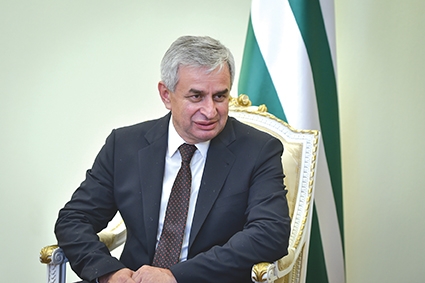Mimosa and Gunpowder in Sokhumi
OPED
Around the second anniversary of the Tangerines Revolution in occupied Abkhazia, the new Mimosa Revolution is now underway. We hear that, together with the scent of Mimosas, gunpowder can be smelled in the city of Sokhumi with the so-called President of the occupied territory, Raul Khajimba, having set the date for the referendum about the need for early presidential elections for July 10th. Whether or not he’ll be able to avoid the revolution by means of that referendum is unknown even within his closest circle.
As the local opposition says, “The Moor has done his duty. The Moor can go.” The Moor in this case is of course Khajimba, who, as the head of the referendum initiative Daur Tania says, failed to fulfill any of the election promises given to Abkhazians. “[He] couldn’t change the clannish government, couldn’t improve the economic situation and failed to increase the Russian subsidy.” In addition to the unfulfilled promises, the reason for disfavoring Khajimba is also his origins. Unlike the previous de facto presidents, he is not from the Abkhazian elite and is not from Gudauta (a region in Abkhazia), instead heralding from Tkvarcheli. Two years ago he was elected President only for his former friendship with Putin. Like Putin, Khajimba is also a KGB officer. Despite this, the main reason behind the attacks on Khajimba is said to be the Turkish problem, because when the confrontation peaked between Moscow and Ankara, Khajimba clearly sided with Moscow.
Indeed, Khajimba’s direct order was to ban Turkish ships from entering Sokhumi Port. The Turkish were also denied the right to export ore from the Tkvarcheli coal mines. Other Turkish businesses closed down. Expert on Caucasus Issues, Mamuka Areshidze, said that it was precisely the disruption of the Russian-Turkish balance that turned Khajimba’s government upside down. Whether Khajimba will be able to avoid the existing political crisis or not will become apparent at the referendum. Khajimba is confident that the Abkhazian people will become fully aware of the existing situation, which includeds electricity deficits and budget sequestration, before 10th July and that “the irresponsible policy of the opposition will get a proper response from the citizens.”
On 10th July, the population residing on the occupied territory will need to answer the question “does it consider early presidential elections necessary?” The region of Gali, densely populated by Georgians, will not have the opportunity to vote, as they are currently deprived of this right. And this is exactly how Khajimba came to power, in an initiative supported by Abkhazians. Today, the situation is different, as the main allies of the Abkhazian opposition in their quest to remove Khajimba’s government are exactly these Georgians from Gali. Therefore, negotations are ongoing to give Georgian Gali back the right to vote.
Fifty thousand Georgians live in Gali today- it is the second largest ethnic group after Abkhazians. Slightly more than sixty thousand people are ethnic Abkhazian and most of them are against Khajimba. Considering the fact that the sum of votes of both Abkhazians and Georgians makes up the majority, simple arithmetics suggests that the fate of Khajimba depends on the vote of the Georgians. Whether in the remaining days before the referendum the opposition will be able to return the right to vote to Georgians through the required legislative change will soon be known. “Khajimba might want to show Moscow that local population is unsatisfied by the laws that Russia wants Abkhazia to adopt,” says Areshidze. “Stories spread through various internet sources suggest that serious warning messages are being sent from Russia and that if Abkhazians do not agree, the rebellion of the second largest ethnic group will be inevitable.”
Zaza Jgarkava












